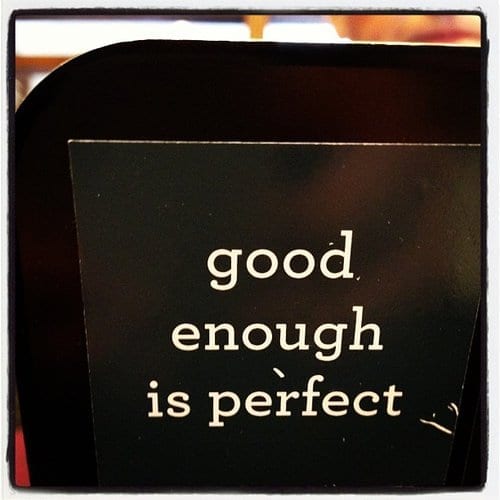In the world of church production, the phrase “Good Enough” is used far too often, and even typing it, it sends chills up my spine. There are some people that say it out of ignorance of what it really takes to make things happen. They will generally never stop saying it. Then there are some people that know better and should never say it.
The reason it makes my skin crawl is that I give in to laziness when I say the phrase “good enough”. If you’ve ever worked with me before, you might be thinking that I’m contradicting myself. I know that I’ve said that something was good enough before. I’m pretty sure I said it a few times over this past Christmas.
There are certain situations that require the use of the phrase, but only after certain criteria have been met. For those of you in the perfectionistic category, you will struggle to ever agree that something is “good enough”, but it is a skill that we all must learn how to say at the right moments.
If you’ve ever read Seth Godin’s blog (and if you don’t, you should start), he talks a lot about shipping your product, whatever it might be. There always comes a point where something has to be good enough so that people can start experiencing what you’ve done. If you never get there, nothing really ever gets accomplished.

So how do we know when something is “good enough”?
When All Your Resources Are Exhausted
Have you used everything you have to the fullest? Does your budget fully support the ideas that you are trying to accomplish? Have you leveraged every hour and each volunteer to accomplish the task?
If you have tried everything at your disposal and worked as hard as you can, guess what? It’s good enough.
Since for most of us, our personal time doesn’t always seem to count as a resource, we tend to overdo it in that category. But if it can be better by staying up all night, why wouldn’t I do that? I’m definitely in the camp of doing whatever it takes to make something happen, but you can’t always pull all-nighters to get something done, or else you’ll fry yourself.
In a debrief after a Saturday night service, if there are some suggested changes, I always weigh them against how long it is going to take vs. how much are people going to notice. Sometimes it makes sense to stay all night to make changes. Sometimes, it isn’t even worth staying an extra hour.
Kay Factor
This was a phrase I learned from one of my mentors, Marty O’Connor. When he was doing production work at Willow Creek in the ’80s and ’90s, he would often ask himself if spending extra time or money on something would be noticed by his wife, Kay. If she couldn’t tell the difference, then it was good enough.
If adding one more spinning gobo will take an extra hour, but nobody will really ever notice, it might be worth not doing. If the spinning gobo isn’t transitioning nicely to the next cue, now that’s something to stay an extra hour to fix, because Kay would definitely notice that.
Letting Go of Creativity
It seems to me that it is easier for us to get caught up in making something cool, and lose sight of hitting the basics and calling it good. For many technical artists that I know, we want to help create moments, which tend to take more time to do. I’m not suggesting we don’t work hard at those, but I am suggesting that we need to put that time into the context of everything else going on. Sometimes it needs to be “good enough”, so that you can have more time with your family or spend that time developing more volunteers.
The basics of production can never be just “good enough”. We need to nail them. When it comes to enhancing a moment or pouring your creativity into something extra, we will eventually get to a place where it has to be good enough.
Profitable
In the church world, profitability isn’t really a thing. Our successes are measured differently. However, in the real world of production, they come to the “good enough” place all the time, because making it better will cost more. Whether it is the exact right piece of gear or having a crew spend all night on something, the client gets charged for that.
When I look back on some of the decisions I made personally or for my team, I never had to consider this factor. But if had to think decisions through the lens of profitability, I would have called more things “good enough” sooner.
Do you use the phrase “good enough”? Are you sacrificing the basics or are you being smart with your resources? Does your “good enough” mean that you are being smart with your resources?










